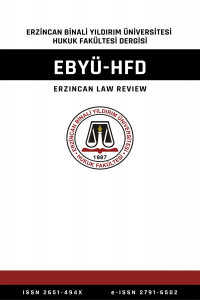UNIDROIT VE AVRUPA BORÇLAR HUKUKU PRENSİPLERİ IŞIĞINDA AŞIRI İFA GÜÇLÜĞÜ
Mücbir sebep, sözleşmenin uyarlanması, dürüstlük kuralı
EXTREME FULLFILLMENT DIFFICULTY IN ACCORDANCE WITH THE PRINCIPLES OF UNIDROIT AND EUROPEAN LAW OF OBLIGATIONS
___
- ARAT, Ayşe, Sözleşmenin Değişen Şartlara Uyarlanması, Ankara, 2006.
- BACKHAUS, Richard, “The Limits of the Duty to Perform in the Principles of European Contract Law”, vol. 8.1 (March 2004), http://www.ejcl.org.
- BEALE, Hugh, “The Development of European Private Law and European Commission’s Action Plan on Contract Law”, Juridica International X/2005.
- DREATTA, Ugo, “Force Majeure Clauses in International Trade Practise”, 5 International Business Law Journal, 1996.
- EREN, Fikret, Borçlar Hukuku Genel Hükümler, 8. Baskı, İstanbul, 2003.
- FLAMBOURAS, Dionysios P, “The Doctrines of Impossibility of Performance and clausula rebus sic stantibus in the 1980 Vienna Convention on Contracts for the International Sale of Goods and the Principles of European Contract Law: A Comparative Analysis”, 13 Pace International Law Review (Fall 2001).
- KAPLAN, İbrahim, Hâkimin Sözleşmeye Müdahalesi, 2. baskı, Ankara, 2007
- KESSEDJIAN, Catherine, “Competing Approaches to Force Majeure and Hardship”, 25 International Review of Law and Economics September 2005.
- LANDO, Ole, Principles of European Contract Law and UNIDROIT Principles: Similarities, Differences and Perspectives, Saggi Conferenze E Seminari 49, Rome 2002.
- PERILLO, Joseph M., “Force Majeure and Hardship under the UNIDROIT Principles of International Commercial Contracts”, 1998. http://cisgw3.law.pace.edu/cisg/biblio.
- PUELINCKX, A.,H., “Frustration, Hardship, Force Majeure, Imprévision, Wegfall der Geschäftsgrundlage, Unmöglichkeit, Changed Circumstances”, http://tldb.uni-koeln.de/.
- RIMKE, Joern, “Force majeure and hardship: Application in international trade practice with specific regard to the CISG and the UNIDROIT Principles of International Commercial Contracts”, Pace Review of the Convention on Contracts for the International Sale of Goods, Kluwer (1999-2000).
- RIVKIN, David W., Lex Mercatoria And Force Majeure, s. 168, Transnational Rules in International Commercial Arbitration, (ICC Pub. No: 480/4), Paris, 1993.
- SOUTHERİNGTON,Tom, Impossibility of Performance and Other Excuses in International Trade, Turku 2001, www.cisgw3.law.pace.edu/cisg/biblio.
- UNIDROIT Principles of International Commercial Contracts 2004, Rome, 2004.
- http://ourworld.compuserve.com/homepages/pntodd/cases/cases_t/tsakirog.htm
- ISSN: 2651-494X
- Yayın Aralığı: 1
- Başlangıç: 2002
- Yayıncı: Erzincan Üniversitesi Hukuk Fakültesi Dekanlığı
SİYASETLE İLGİLENEN TÜRK KADINLARININ SOSYO-EKONOMİK DURUM ANALİZİ
Özlem ÇAKIR, Olca SÜRGEVIL, Tijen ERSOY HARCAR, Gönül BUDAK
KAMU MALİYESİNDE SINIR ÖTESİ BİR KAVRAM: KÜRESEL KAMUSAL MALLAR
AZERBAYCAN HUKUKUNDA MARKA HAKKININ KORUNMASI
UNIDROIT VE AVRUPA BORÇLAR HUKUKU PRENSİPLERİ IŞIĞINDA AŞIRI İFA GÜÇLÜĞÜ
BÜYÜKŞEHİR BELEDİYESİ SINIRLARI İÇERİSİNDE İLÇE KURULMASI HAKKINDA KANUNUN DEĞERLENDİRİLMESİ
TÜRKİYE'DE TEMEL HAK VE ÖZGÜRLÜKLERİN GELİŞİMİ AÇISINDAN 1909 ANAYASA DEĞİŞİKLİKLERİNİN ÖNEMİ
